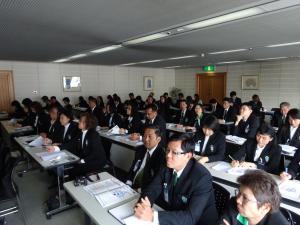
Dates: 16-19 March 2015
Place: Aichi, Toyota, Kyoto and Osaka
Upon the request from Bangkok Metropolitan Administration (BMA), UNCRD provided a training programme on 16, 17 and 19 March 2015 in Japan. This programme comprised an important part of the 15th Intermediate Executive Bangkok Metropolitan Management Programme, which was conducted by the Training and Development Institute of BMA. The training programme was attended by 72 middle executive officials of BMA led by Mr. Krisda Klantanon, Deputy Permanent Secretary, with all the cost born by BMA.
Objectives
- to enhance each participant's understanding about sustainable urban development to identify applicable policy and/or initiative options for promoting sustainable development in the context of Bangkok; and
- to expose participants to actual cases and experiences of sustainable urban development through visiting and exchanging opinion with local governments of Aichi Prefecture, Toyota City, Kyoto City and Osaka City.
Course Contents
The training curriculum was designed by UNCRD, taking into account the needs as well as the current condition of Bangkok. It consisted of four modules: policy formulation; urban renewal; environment; and tourism. As for policy formulation, participants learned and discussed about Aichi Vision 2020 with senior officials of Aichi Prefectural Government, with which BMA has strengthened relationship since the Aichi-Bangkok memorandum on mutual cooperation launched in 2012. The BMA delegation visited Toyota City Government and its pavilion, "Ecoful Town" to learn the experience of Toyota City for creating a low-carbon society. The curriculum also included field study visits to Kyoto City for its Tourism Promotion Plan 2020 and relevant policies and projects and Osaka City for promoting urban renewal projects in the city centre. At the respective cities, participants saw these actual examples of good practices and engaged in lively discussion with senior government officials.
Outputs and Evaluation
As the final output, participants formulated and made presentations on what they had learned and how it could be introduced and applied in Bangkok after returning to their home country. Judging from the results of the course evaluation questionnaire, the majority of participants was in agreement that the curriculum prepared by UNCRD responded to their expectation and needs and the main objective was achieved.
TRAINING MATERIALS

